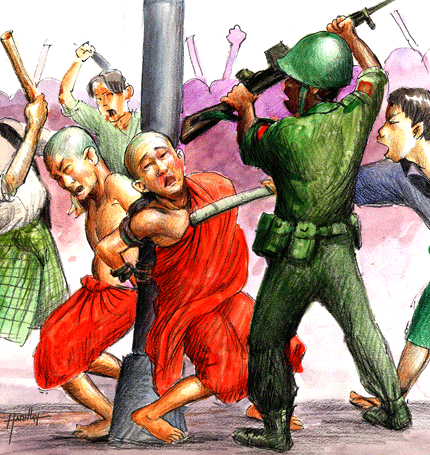
From The eXiled’s Special Australasia Correspondent
PERTH, AUSTRALIA–Myanmar’s been making news lately, especially here in Australia. Most of it involves Kevin Rudd, our Foreign Minister, who’s gone there on a diplomatic mission, making weird pleas to the Burmese government not to kill Aung San Suu Kyi (as if they’d ever want to do that):
…it is absolutely critical that the Burmese government guarantee Aung San Suu Kyi’s security while such a tour of the country was undertaken. I believe all governments around the world would be looking very carefully at how the security is provided for by the government.
If you aren’t fluent in embassy-speak, this is what Rudd’s really implying: “They’re gonna kill that poor woman! They’re gonna kill that PAAAW woman!”
He needn’t have bothered. The truth is that Burmese politics is stuck in the same stalemate as ever: Burma’s local oligarchy has the guns and money; Aung San Suu Kyi has the hearts‘n’minds. Neither side can get rid of the other and that’s how it’s been for over twenty years. In situations like this, there are only three possible tiebreakers: 1) the elite commits suicide, Gorbachev-style; 2) a stronger country invades and sets up its own government; 3) “the people” revolt.
Option Two isn’t likely. No one–neither China nor the West– really seems interested in taking over Myanmar.
So how about Option One: a sort of late-Soviet perestroika self-destruction? Not happening. Last year saw some cosmetic changes – a new flag, the creation of a phony Potemkin parliament – but nothing comparable to actual glasnost’.
So that leaves only one possibility: a people’s revolution. But there’s a snag: popular uprisings really only succeed in countries with large populations of angry young men. Poland in the early 80s. Romania in ’89, Czechoslovakia in ’89, Indonesia in ’98, Egypt in ’11 – look at the population pyramids for those countries, and you’ll see they had an awful lot of 15-25 year olds, right when the shit hit the entrenched-ruling-elite fan.
Same goes for the pro-Western “color revolutions” in the Ukraine, Georgia and Kyrgyzstan: demographic spikes in the 15-19 and 20-25 groups followed by rapid regime change. With revolutions, it’s age that matters. More than geography. Maybe more than ethnicity. Definitely more than fucking Twitter.
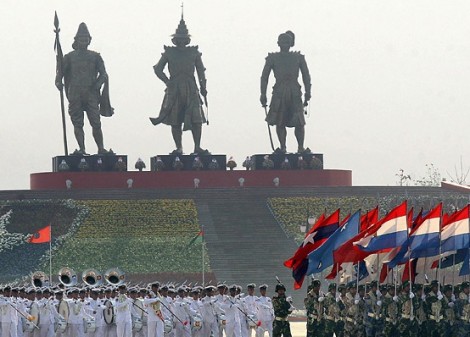
Wanna know just one reason why Western countries are so apathetic? Look at America’s boomer-dominated population pyramid. (Australia’s is pretty much the same shape – my generation won’t come equal with our boomers until 2020.) Just as there’s safety in numbers, there’s also power in numbers, and, in the West, young people know damn well they’re not powerful. Society’s a prison farm. The boomers are the guards. They’re holding the stick. There aren’t enough of us to riot; no one will join in. Don’t get any ideas. Grovel hard.
So what does Myanmar’s population look like? Its last baby boom happened in the 80s, when the fertility rate was 4.0 to 4.7 – that’s four or five kids per mother. Today it’s just over two kids. This means people born before the mid-90s pose more danger to the regime than any generation after them.
Those people hit twenty during the last decade, and, sure enough, massive protests suddenly broke out in 2007 after 19 years of relative tranquility. Media sources never failed to mention that the protests were “monk-led,” but no one seems to have caught the significance of that. By Southeast Asian standards, monks are basically college students (especially in Myanmar, where the government was smart enough to close most universities after the ’88 riots). As Clausewitz might’ve said: “A monastery is a frat house by other means.”
And these monks weren’t wimps. According to a report from The Irrawaddy from 2007:
More than 10 high ranking officials and military officers were held hostage for about six hours on Thursday by monks at a monastery in Pakokku township in Upper Burma. The captors demanded the release of about 10 fellow monks arrested in a peaceful demonstration that was violently broken up by the authorities on Wednesday.
The monks captured their hostages during a standoff in which four official cars were set on fire. The hostages included the chairman of the District Peace and Development Council in Pakokku, a regional centre about 370 miles north of Rangoon with a sizeable community of monks. The hostages were freed at around 4 p.m. but it was unclear how the two sides resolved the standoff.
No wonder Orwell–who served as a colonial enforcer in Burma–hated Burma’s monks so much. By his own admission, Orwell “thought that the greatest joy in the world would be to drive a bayonet into a Buddhist priest’s guts.” Those “peaceful” monk-led protests weren’t so much a Buddhist love-in as a pent-up testosterone time bomb exploding in the generals’ faces.
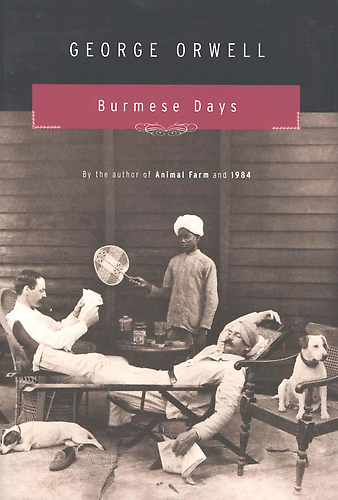
[Read Dr. Dolan’s article “Big Brothers: George Orwell and Christopher Hitchens Exposed“]
There’s a story, too, behind what actually caused the protests. For years, the IMF has been pushing developing countries to kill fuel subsidies designed to lower the price of petrol (and hence transportation, and hence most consumer goods). So when the IMF sent a delegation to Myanmar in 2007, the Burmese government decided to impress their shock doctrine sahibs by chopping those pesky free-lunch subsidies. The price per gallon doubled immediately, from $1.40 to $2.80. This, in a country where most people earn about $2 a day.
There you go. Myanmar’s biggest demonstrations since ’88 – the first where government troops attacked monks – weren’t sparked by Aung San Suu Kyi’s three house arrests. Nor were the riots caused by government censorship, travel restrictions, ethnic forced labour, state-sanctioned torture, or any other form of dastardly Oriental despotism.
Rather, the monks revolted because their government took austerity advice from the IMF, a cabal of colonial loan sharks led by an aging Eurotrash throat-rapist.
And despite the violence, the IMF’s austerity medicine plan for Burma hasn’t changed. Last year, the IMF put out a working paper, “The Unequal Benefits of Fuel Subsidies.” It complained that despite the rise in global fuel prices from 2003-2008, “many governments in developing nations were reluctant to fully pass through these price increases to domestic consumers, resulting in substantial fiscal costs.” The paper worries, like a good loan shark would, not about the burden on the world’s poor, but rather, “about the fiscal risk associated with less than full pass-through of these increases to domestic prices.” (I love that phrase, “less than full pass-through.” Makes it sound like those poor consumers are getting insufficiently shat on by sleazy speculators.) The paper also admits that two countries which tried to follow the IMF gameplan and slowly do away with fuel subsidies – Indonesia and Ghana – soon abandoned these “liberalization” schemes, and reinstated subsidized fuel.
By now you should’ve guessed the two components of a successful modern revolution: a large population of angry young people, and some spark to rouse them into revolution-action.
So how would the oligarchy plan to survive this possibility? Well, let’s look at Myanmar’s population pyramid for 2011:
The most dangerous age groups here are the 15-19s and 20-24s. The government’s best hope is to sit it out for five or ten years, wait for all the teens to grow up, settle down, mellow a bit and start having thirty-something-life crises.
That’s why the Burmese regime held mock elections last year – to stall those lethal twentysomethings for a little while longer, hoping the kids would take the bait, and hold off the revolution for a few more years, until the hormones drain away. And since most adolescents have next to no attention span, even a few years’ delay is enough to take the wind out of a potential uprising.
When it comes to Burmese politics, the real question is, who’ll win the war of attrition.
That’s why personal safety’s the least of Suu Kyi’s concerns. The closest she’s ever gotten to assassination was April 1989, when a provincial army captain threatened to shoot her if she crossed a six-man line – he was stopped by his commanding officer, who knew killing her would be suicidal for the junta. Suu Kyi’s real worry should be that the generals won’t do anything to trigger a revolution. Worse, even if they do, they now have twice the number of troops they had in 1988 – and unlike the Egyptians, Burma’s troops aren’t squeamish about attacking civilians. Or monks.
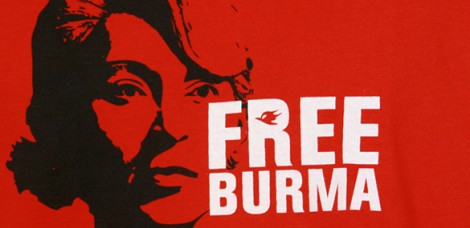
From what I saw while visiting Myanmar, the junta’s stalling tactic doesn’t seem to be working all that well. I was in Yangon just before last November’s elections, and from my personal anecdotal evidence, I couldn’t find anyone interested enough to actually vote. The newspapers and TV channels were full of campaign information and get-out-the-vote propaganda, but you never saw much out on the streets of except for the occasional poster. In private conversations, the election ranked as a yeah, whatever side-topic at most – the Burmese had about as much passion for the elections as 21st century Australians would for a royal visit: “Oh yeah, before you go, the Queen’ll be in Perth tomorrow for half an hour, yeah, then she’s off to Darwin. The West says St. George’s Terrace’ll be sealed off, so maybe you should park the car on Murray Street. Have a lovely weekend! You toooo!”
The Burmese in Yangon assumed all the action was happening in the countryside, while the people I met in Shan State assumed it was all in Yangon. In the city center where I was around election time, the Internet kept getting cut off. So I’d go to a building on Sule Paya Rd and climb a dilapidated spiral staircase up to the café on the second floor. Myanmar’s Internet still runs at mid-90s dialup speed. Accessing any site (including Gmail) required a proxy tunnelling program which only lasted 5-10 minutes. When the tunnel caved in, I’d get the message “Your Freedom is endangered!” and call one of the proxy-garçons who went from table to table like waiters. On election weekend, the Internet cafés were closed. Some people were touchy about letting Westerners into their homes until the following Monday when it was all over.
On TV, though, nothing but endless speeches. First you’d see a representative from the junta’s party, the USDP. He’d give a speech about how Burmese democracy could only be attained through stability. Then an Indian Muslim politician would appear, also giving a speech about how Burmese democracy could only be attained through stability. Every party, it seems, had exactly the same talking points. Nor did any candidate say a word about the people they were running against. This was disappointing. In Western countries, the Red Team at least pretends to hate the Blue Team when the cameras are rolling: “Damn those Autobots!” That kinda thing. The Burmese oligarchy, though, doesn’t seem to have figured out how to stage play-fights properly; how to make it look like two near-identical Dempublican factions actually represent wildly opposing philosophies. As a stalling strategy, that might actually work.
This raises another question: when (and why) did the West decide that Myanmar’s junta was worse than other governments in Southeast Asia? If you trawl through the archives of the New York Times, you’ll find this starts to happen around the early 90s. That’s when Myanmar stops being another third-world country (like Bangladesh or Bhutan) and all the rhetoric becomes morally charged. Here, for example, is a NY Times editorial calling for sanctions against Myanmar, dated March 24, 1997:
The decision whether to apply sanctions to Myanmar for its human rights abuses now rests with President Clinton. Last July, Congress passed a law calling for a ban on new American investment in Myanmar if that country’s repressive Government harmed or rearrested the democracy leader Daw Aung San Suu Kyi or cracked down on the democracy movement. The President’s top foreign-policy advisers are divided. For the sake not only of democracy in Myanmar, but also of American credibility when dealing with other dictatorial regimes, President Clinton should invoke the law.
The case for sanctions on Myanmar, formerly known as Burma, is more convincing than perhaps anywhere else in the world. If President Clinton chooses not to apply them, there is little reason any other abusive country should take Washington’s tough talk seriously.
By all credible accounts, including the State Department’s annual human rights report, Myanmar’s Government has met if not exceeded the conditions in the sanctions legislation. In 1996, the worst year of repression in this decade, it detained hundreds of students and activists and held Mrs. Aung San Suu Kyi under virtual house arrest in December. Mrs. Aung San Suu Kyi, who would be Myanmar’s elected leader had the Government not annulled 1990 elections, has appealed to Washington to apply the sanctions.
The sanctions would also cost American business little. The United States currently has only about $220 million invested in Myanmar, almost all of it in oil and gas projects. Many American companies have already pulled out in response to public pressure and new laws in Massachusetts and several cities prohibiting government contracts with companies that do business in Myanmar.
The first thing you might wonder, reading this, is: Who decided Myanmar should be the measure of “America’s credibility when dealing with… dictatorial regimes.” Why not good ol’ US-aligned Indonesia? Suharto butchered 500,000 Timorese in five years and was still slaughtering West Papuans by the thousands into the early 1990s. That’s a far bigger genocide than anything the Burmese junta pulled off, but the NYT rarely said anything harsh about Suharto except that he was “stern” in the manner of a boarding school dean – this was after he’d banned the Indonesian Communist Party and imprisoned nearly 600,000 political dissidents.
But then the Times‘ editorial admits it: “The sanctions would also cost American business little.” In other words, America’s got a choice of various countries it can impose sanctions on (in exchange for this “credibility” stuff) and Myanmar’s one of the more affordable ones where there’s little downside, and lots of credibility upside. And that’s what matters to these Clintonite “liberal hawks”: looking like they have a conscience, without risking anything serious. It’s the Prius hybrid approach to international affairs.
The Burmese junta makes a great bogeyman for the lib-hawks of the New York Times. Finally, a government they can trash with complete impunity, unleashing their inner neocon side without risking do-gooder creds. Their criticisms don’t even have to be factually accurate, as Nicholas Kristof demonstrated in 2009 with a pathetic attempt (“Sneaking In Where Thugs Rule”) to jump aboard the Suu Kyi bandwagon. Kristoff visited a Burmese town called Myawaddy, crossing the Thai border as a day-tripper. Having cleared the immigration post, he went egg-hunting for signs of tyranny. Myawaddy’s not the best place for this for the simple reason that those Burmese towns near the Thailand border are generally quite affluent and barely resemble the rest of the country.
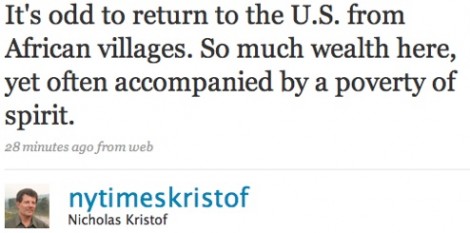
More deep thoughts by Nicholas Kristof
So Kristof punched out a lame piece where he contrasted Thailand’s “bustle and dynamism” with Myanmar’s “shacks beside open sewers.” (Gee, are there many countries in Southeast Asia that don’t have shacks beside open sewers?) Kristof followed this up by claiming that “the most flourishing business [he saw] belonged to a snake charmer.” It’s just bullshit – border towns are always full of commerce – but nothing sells dispatches like a splash of Rikki-Tikki-Tavi.
If you need any more evidence that Kristof doesn’t know Burmese politics from his own ass, read (if you can) his blog, where he writes “nobody except the regime uses the word Myanmar.”
Sorry Kristof, that’s simply not true. In Yangon, I had a hard time finding people who used either “Burma” or “Rangoon” (at least in English). The exceptions were all boomer-age, the sorts who’d call St. Petersburg “Leningrad” if they were Russians. They preferred “Burma” but that had less to do with their opinion of Suu Kyi than their generation. Plenty of people who hated the junta called their country “Myanmar.” It was also more common in general to hear “Myanma people” than “Burmese.” And this was in Yangon: the most pro-Western, anti-military, part of the country. You could literally spend weeks there without seeing a single slouch hat – definitely not the place for Jean Genet men-in-uniform fantasies.
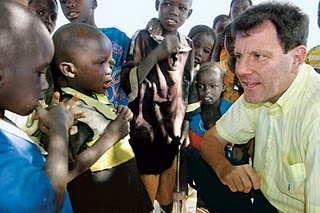
Nicholas “The Vampire” Kristof acquires credibility
Kristof and his fellow hacks aside, Myanmar caught the attention of a much smarter and more serious lib-hawk: the great political strategist, Gene Sharp. Since the 1950’s, Sharp has devoted his career to forming strategies built around what he calls “realistic non-violent struggle.” In fact, it was his magnum opus, From Dictatorship To Democracy, that provided the strategy for the East European “color revolutions” of the early 2000s. The book’s first chapter makes it clear that Sharp is in the CIA camp when it comes to foreign policy:
There has indeed been a trend towards greater freedom and democratisation in the world in the past decades. According to Freedom House, which compiles a yearly international survey of the status of political rights and civil liberties, the number of countries in the world classified as “Free” has grown significantly in recent years: […]
However this positive trend is tempered by the large numbers of people still living under conditions of tyranny. As of 2008, 34% of the world’s 6.68 billion population lived in countries classified as “Not Free,” that is, areas with extremely restricted political rights and civil liberties.
In case you haven’t heard of it, Freedom House is a dubious neocon NGO with heavy CIA links – its Chairman from 2003-05 was former CIA director R. James Woolsey – that declares countries “Free” when they support the US military-industrial complex and “Not Free” when they resist. As the paragraph above shows, this also seems to be the basis for Sharp’s definition of “freedom,” since he considers the rise in the number of US-aligned nations to be a “positive trend.”
[Read Mark Ames’ article “Freedom’s Just Another Word For Fascism.“]
But Sharp isn’t a mere CIA propagandist, and he’s nothing at all like the cheap spin doctors who produce Freedom House’s annual report. From Dictatorship To Democracy formed the basic strategy for a huge number of recent uprisings: the Serbian revolution against Milosevic, the Orange Revolution in the Ukraine, the Tulip Revolution in Kyrgyzstan, the Rose Revolution in Georgia, this year’s uprising in Egypt. Whether Sharp knows it or not (and he probably does) he’s a major asset to the CIA team. As Ames noted in 2005, Freedom House mass-printed copies of Sharp’s book and distributed them amongst the Serb opposition group, Otpor, shortly before Milosevic’s fall.
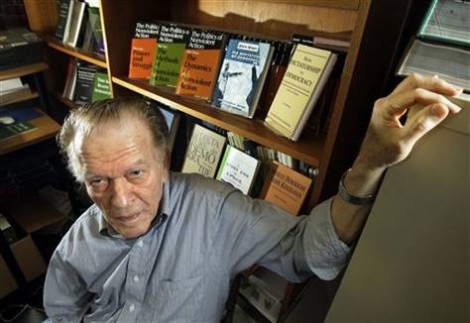
Gene Sharp: Revolutionary guru or CIA braintrust?
And guess which country was the prototype for Sharp’s idea of non-violent revolution? If you guessed Myanmar, you guessed correct. In an interview with The Irrawaddy, Sharpe explains that From Dictatorship to Democracy was originally written as a series of articles for a Burmese émigré newspaper based in Bangkok. Shortly after, it was translated into Karen, Mon, Chin and Jing-paw, apparently for distribution among Myanmar’s ethnic minorities. According to a 2001 Salon article, this was at the request of Aung San Suu Kyi herself.
However, dissidents in Myanmar weren’t so interested. According to Sharp, the country’s ethnic opposition groups had too many “armies and mini-armies” which they weren’t willing to scrap, and “although From Dictatorship to Democracy was written for Burmese, there were no Burmese groups who really took that analysis seriously or used at [sic] as a strategy for the liberation of Burma.”
There’s some truth to this. Certainly, monks were still using violent tactics in 2007. But Aung San Suu Kyi seems to have borrowed a lot from Sharp, whose entire playbook is based on the idea that governments require people’s participation to function and that a dictatorship will soon “[die] of starvation” if its subjects are uncooperative enough. In the mid-90s, Suu Kyi encouraged Westerners to boycott Myanmar completely and avoid travelling there – this happened just as the government started building large numbers of hotels. As Sharp observes: “The requirements and effects of the regime’s past policies will somewhat limit its present ability to adopt and implement conflicting policies.” It’s this kind of stuff that makes you wonder whether the apathy over the elections was yet another weapon.
Still, I don’t have too many hopes up about Aung San Suu Kyi. Well-intentioned or not, she has the backing of a whole heap of CIA-aligned groups who seem to be counting on her to become another pro-US colour revolutionary. Besides Freedom House, she’s also gotten attention from Reporters Without Borders (RWB). As CounterPunch reported in 2005 and 2006, Reporters Without Borders received funding from the Center for a Free Cuba and Otto Reich, one of the backers of the 2002 Venezuelan military coup against Hugo Chavez. It’s also taken money from the International Republican Institute, another group that supported the coups. Like Freedom House, it’s inordinately aggressive towards countries that stand in the way of US foreign policy – CounterPunch’s Diana Barahona observed in ’05 that Reporters Without Borders gave Cuba “a lower ranking on its press freedom index than countries where journalists routinely have been killed.” And now a glowing new biography of Suu Kyi has appeared in stores, titled Struggle For Freedom, authored by Jesper Bengtsson, who is, naturally, president of Reporters Without Borders in Sweden.
One thing that’s confused me about Suu Kyi is how she has kept oddly quiet about the people who really fucked Myanmar up in the first place, before the junta came along: The British colonial overlords. It was the Brits whom Suu Kyi’s father fought against when he led the struggle for Burmese independence.
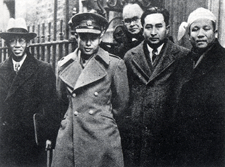
General Aung San started out as a vaguely Marxist revolutionary before the Second World War and gathered together a group of followers known as the Thirty Comrades. In 1940, he led the Thirty Comrades north towards China, seeking assistance from the Chinese Communist Party, but accidentally met with Japanese intelligence instead. The Nipponese gave the Comrades some military training to fight against the British colonials, and allowed them to hole up in Thailand (then occupied by Japan) while they mapped out their return to Myanmar. In one of the most famous events in Burmese military history, twenty five of the Comrades came together at a house in Bangkok, combined their blood in an ornate metal bowl and took turns drinking it after pledging loyalty to each other. When I visited the Defence Services Museum in Yangon, I was shown the original 2cc glass-barrel syringe they’d used to draw their blood and squirt it into the mixing bowl.
“What?” I asked. “Thirty guys to one works?”
My guide shrugged. “No AIDS back then.”
And they shared that needle in vain. (Or should it be “in vein”?) In 1947, shortly before independence, Aung San was assassinated by thugs working for his pro-British rival, U Saw. The killing lead to some interesting (and quite plausible) theories that Britain planned the murder of Aung San Suu Kyi’s father. In 1997, Kyaw Zaw, one of only two surviving members of the Thirty Comrades, claimed that the British ignored police surveillance reports that U Saw was plotting an attack. Shortly after Gen. Aung San’s death, a British army captain, David Vivian, was found to have secretly handed 170 Bren guns and 100 Sten guns to U Saw’s faction, and supposedly Captain Vivian had “no personal profit motive.” At least two other officers supplied U Saw with guns and ammo, possibly even the dum-dums used to kill Aung San. Captain Vivian was sent to Insein Prison for his role, but he escaped during a Karen riot in 1949 and returned to England via Thailand. (Unlike the Burmese, the Karen were still largely pro-British at this point, owing to Britain’s old colonial favoritism tactic, pitting ethnic group against ethnic group.) The ease with which Vivian made his getaway raises further suspicions that he wasn’t working alone. It’s not like there was a spook shortage in the region – less than five years later, the Burmese would battle a large, CIA-backed army of Chinese Nationalists in its opium-producing northeastern border with China.
Aung San’s death deprived the Comrades of a leader and a rift soon appeared between Ne Win and the group’s old communists. After taking power in ’62, Ne Win imprisoned the better part of his remaining blood brothers and brought the country under junta rule for the first time. Kyaw Zaw was exiled to China and leads the Communist Party of Burma from Yunnan Province. The other surviving Comrade, Ye Htut, retired from politics and lives in his home village two miles from Naypyidaw.
Aung San Suu Kyi’s biography of her father (in her essay collection, Freedom From Fear) is oddly quiet about his murder. She gives it two paragraphs and then quickly changes the subject. There is no mention of U Saw’s pro-British stance (for instance, he refused to sign any transfer-of-power agreements during Aung San’s delegation to London). Suu Kyi simply claims Saw had a “strange belief that once [Aung San’s cabinet] had been removed, he would become the head of the Burmese government.” It would be a “strange belief” if the decision fell to the Burmese people, but the country was still under British occupation. Suu Kyi avoids drawing attention to this – the last four pages of her essay don’t even mention the Brits by name! Just before the killing, she writes, “plans for the official transfer of power proceeded apace,” and she declares that independence “arduously came within reach,” both roundabout ways of saying: “Tommy still ran the joint.”
I can’t say whether or not the British did sponsor Aung San’s assassination, but given what the Brits have done everywhere else, shouldn’t Suu Kyi at least be curious?
Her motivations for keeping quiet about this aren’t entirely clear. On one hand, it’s in her interest to have the British on her side today. Also, she was practically raised a Brit, living in Oxford for decades, speaking with a perfect RP accent – by her own admission, her favourite writers are the pseudo-Brit T.S. Eliot, and the all-too-British Alfred Lord Tennyson. Part of me hopes, desperately, that she’s keeping mum for good reasons. The same goes for her politics. Suu Kyi has kept very quiet about how she thinks a post-junta Myanmar should be run – whether it should resist the IMF or not, whether it should allow the sort of wholesale looting that happened in much of Southeast Asia and Russia during the 90’s. Again, my strongest hope is that Suu Kyi is using the CIA and the Brits, just as her father used both the Japanese and the Brits to achieve his objectives.
But if Myanmar does fall to a color revolutionary regime like Saakashvili’s in Georgia, then God help it. The Burmese I met during my stay knew much more about how their government worked than most Americans or Australians know about their own – one advantage that comes with having no decent media to distract you is that everyone becomes an amateur Woodward and Bernstein – but they had a tough time grasping just how Byzantine the politics in Western countries really are. Their images of America and Britain are dangerously rosy and naive, the result of decades under a government that rules through force rather than the more subtle authoritarianism in the West. The only negative information they got about the West came through poorly-written propaganda tabloids. It didn’t seem the government had bothered to translate Chomsky or Parenti or any other leftist who might’ve made a convincing case for Myanmar isolationism. Instead, it gave the 2006 Burma National Literature Award for Translation to a Burmese edition of The World Is Flat, Thomas L. Friedman’s paean to globalization.
Don’t ask me why.
Ramon Glazov lives and writes in Perth, Western Australia. Email him at “ramonglazov at gmail dot com”
More articles by Ramon Glazov: “Inside Wikileaks: Revenge of the Second Banana“ and “How Christopher Hitchens Robbed Hunter S. Thompson’s Grave.”
Read more: aung san suu kyi, australia, britain, burma, cia, color revolution, east timor, freedom house, georgia, indonesia, kevin rudd, nicholas kristof, Noam Chomsky, otto reich, Reporters Without Borders, Saakashvili, suharto, thomas friedman, venezuela, Ramon Glazov, Featured


Got something to say to us? Then send us a letter.
Want us to stick around? Donate to The eXiled.
Twitter twerps can follow us at twitter.com/exiledonline





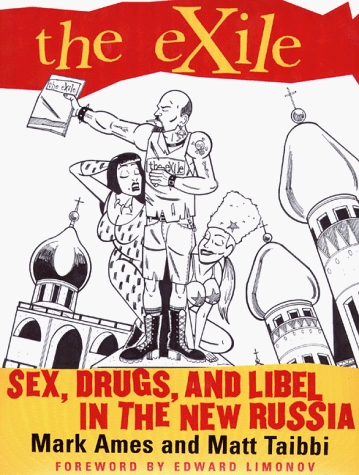









22 Comments
Add your own1. Dude | July 13th, 2011 at 11:34 pm
The key to understanding Burma’s various revolutions is in understanding demography, but the most important aspect is the ethnic affiliation. If you talk at great length to Burmese nationals living elsewhere they’ll basically tell you that the reason nothing changes is that the revolts were previously made up of ethnic minorities – Karen, Shan, Mon, etc. Of course Burman ideologically aligned peoples participated, but by and large it was a minority revolt against a Burman-lead government – this would be in the case of things like 8-8-88.
What was different in this last revolt was that the Burmans revolted, which is why the monks got involved this time. The monks in Burma are not particularly pure folks, but that’s another story. Anyway, the international press kept itching for a national uprising, but what they didn’t understand was that when the Burman majority revolted this time, all the Shan and Karen peoples wanted to do was sit back and laugh at them as the government beat them back under the “Haha, let’s see how YOU like it!” clause of ethnic rivalry.
There’s no chance of a national revolt simply because there’s no nation to speak of. If the regime fell tomorrow, the Karen would form their own state, the Shan would form their own and so on. What holds them together today are deals made between ethnic leaders in the different regions. I forget who has what exactly, but I think the Burman sit on most of the gas, the Karen on much of the gemmstone mining and the Shan on much of the illegal timer trade? That’s probably wrong, but it’s some division. The Thais, of course, are the Liberia to Burma’s Sierra Leone, processing through all the illegal timber and gemstones, but the money goes back to the guys on top and they may hate each other, but they like money more and so they maintain their loosely negotiated peace between one another – even letting the Thais cooperate with the Burmese government folks on the border to run casinos that no Burmese are allowed to enter (but I am!).
So, at least according to the Burmese refugees I know (who still have family there), things have relaxed a bit, but the government’s not going anywhere for the reasons listed above. And when it does, civil war will break out, the state will fracture and that will be that. Who know’s what’ll really happen, but living over here and viewing the Asian intra-ethnic rivalries up close I can believe it.
Mandalay Beer is pretty good!
2. Sam | July 13th, 2011 at 11:35 pm
idk about the color revolutions, but sharp had absolutely nothing to do with the egyptian uprising. my guess is that it was the standard colonial idea that the natives need The White Man to lead them to freedom, and also enforces the myth that the egyptian uprising was non-violent.
3. Mr B | July 13th, 2011 at 11:49 pm
Fkn ace article. Well done!
4. Tuomas Kaila | July 14th, 2011 at 2:08 am
‘Ramon Glazov lives and writes in Perth…’
No he doesn’t.
This article has Dolan written all over it. It’s insightful in a very dolanish kind of way and the last part where he once again brings the bloody brits – whom he loves to hate – definately gives him away.
5. Michal | July 14th, 2011 at 3:09 am
Calling Sharp a CIA propagandist on the basis of the fact that he uses Freedom House figures – like a ton of other pepole, is a dubious statement at best.
The author is upset because USA won’t undermine its standing in the world by targeting US-friendly dictatorships first, with its policy instead focusing on isolated countries like Burma. This is wrong he claims, since the US should dish out democracy to everyone.
Now that sounds pretty moral, reasonable. Why does Glazov then change his tone and practically deplore the colour revolutions? Is the fight for democracy wrong now because those revolutions bolster the US? Didn’t he say right now that democracy should be for everyone?
And what about colour revolutions that did not bolster the US like the one in Kyrgizstan, which is going to lead to expulsion of US forces from the Manas airbase?
6. derpotism | July 14th, 2011 at 7:13 am
@Michal
I’ll have to re-read it to see it from that perspective, I didn’t get the impression that Glazov (or Dolan or whoever, if it even matters) was saying anything along the lines of “The US should give democracy to everyone”- I took away from it the impression that Glazov thinks the US should just leave Burma alone, basically, and that democracy ought not to come from the US but from the wills of people in their own countries.
7. Alex | July 14th, 2011 at 7:27 am
Great article. I’ll certainly be paying attention to demographics more in the future. Also Myanmar.
8. John Drinkwater | July 14th, 2011 at 8:39 am
@Tuomas Kaila
It’s clear that Glazov is influenced (heavily…) by Dolan, but the two are not the same guy. It’s a tribute to Dolan, as he’s spawning some creative talent around the world. Let’s face it: Glazov is very good and a welcome addition to the eXiled. I don’t know shit about Burma, though…
9. Ganryu | July 14th, 2011 at 10:23 am
Hmm, maybe the US (read CIA) has interest in stirring crap in Burma because some General has gotten uppity and decided to raise the price on heroin. Cuts into the Agency’s bottom line, and that’s just not OK.
Curiously, former first lady Laura Bush had a heavy interest in Burma:
http://www.time.com/time/world/article/0,8599,1659170,00.html
http://www.atimes.com/atimes/Southeast_Asia/JH09Ae01.html
I figure if the CIA druggie Bush family is in on the act, it spells trouble.
It was interesting to hear how mum Suu Kyi is on British involvement in her life and country. I see her as an analog to Benazir Bhutto, and, knowing how Benazir “went to pieces” she prefers to get whatever benefits/support on the down low rather than tip off everyone to what a bunch of covert, country-wrecking cunts the British really are.
10. Urethral Nails | July 14th, 2011 at 10:36 am
@5
The point is that the color revolutions were essentially invented in order to manipulate former soviet countries into deregulating their economies even further. It wasn’t about freedom, it was about subjugating more countries to business interests.
11. Tom | July 14th, 2011 at 3:07 pm
Did you guys just link Gene Sharp to the Egyptian uprising?! lol
Oh shit, I didn’t see this:
http://www.nytimes.com/2011/02/14/world/middleeast/14egypt-tunisia-protests.html
12. ElKabong | July 14th, 2011 at 4:58 pm
The view you can see of Burma from Yangon is a very limited one.
For one, if you didn’t try to leave Yangon, you didn’t run into the process of internal travel paperwork and minders. Foreigner taking a phone out into the country? I half suspect that they make you jump through the hoops as a form of indoctrination. And you still end up with one of these portable corded units. Don’t let them catch you with a satphone. Do that around 2am when everyone’s asleep.
In the field, we went through a period of a few weeks when all the expats started going down with with a particularly rough Dengue. Medevaced the first few to Bangkok. It was right before the last two medical personnel, me and a German doc, got sick when we found out those medevacs were one way trips. We both came back with symptoms around the same time and I remember looking at the positive dots on the rapid dipstick thinking, shit we can’t leave because they’ll never let us back in. That was a rough week. Only in Burma.
Urban monasteries are different from rural monasteries. I spent many nights under a monastery roof in the Delta. Rural monks take their societal duties much more seriously than urban monks, who, as it was mentioned in the article, are really just riding herd on a bunch of young men who have no intention of making monastic life a permanent thing. If they were in Northeast Asia, let’s say Korea, urban monks would be rioting college students/union fodder. Rural monks, at least those in the Irrawaddy, have nothing to do with that.
In the city, it’s hard for a short term expat to see the level of corruption and the almost feudalistic military oligarchy that runs the country out the major urban centers. I’ve worked in many of the countries that are on the ass end of the Corruptions Perceptions Index (I used to have Sunday afternoon Tea with Laurent Nkunda at his retreat north of Sake, if that means anything). Haiti, Uganda, DRC, Kenya, Burundi, Somalia, the Stans. I know corruption. The Burmese military takes it to a whole new level. A colonel in the Burmese military is essentially a feudal lord. I’ve never seen an entire society so cowed by the system, before or since.
I was fortunate in that as a westerner, I got to spend a lot of time in rural Myanmar without an escort (gov definitely underestimated how good expat MSFers are at running interference for each other, at least originally.) The internal contempt the Myanmar/Burmese can have for each other is stunning. Considering all the other places I’ve seen boil over, a part of me thinks that an iron hand keeping things at a manageable level isn’t entirely a bad thing.
Anyway, you can have a very good life style as an expat in Yangon. Different world from the Delta, the north an the border states, though.
13. aleke | July 14th, 2011 at 5:58 pm
Excellent piece, Ramon! The biggest obstacle to freedom is the Empire.
On Gene Sharp, there’s an excellent overview of his ‘Albert Einstein Institute’ on SourceWatch http://www.sourcewatch.org/index.php?title=Albert_Einstein_Institution
check out his ‘principals’:
Robert Helvey – (Col., Defence Intelligence Agency)
Edward Atkeson – (Major General, US Army) advisor
Peter Ackerman – (fmr. Chairman of Freedom House) advisor
here’s a good article on Sharp, a good ole Cold Warrior, who had long experience in being a CIA theoretician.
http://www.voltairenet.org/The-Albert-Einstein-Institution
ahh, see? Revolutions are always led by somebody, its a pipedream to think that the masses will spontaneously achieve justice, there’s always a ‘vanguard’, whether its violent commies, disgusting oligarchs, or vile foreign imperial elements. Pick your poison (I pick commie vanguard, but that’s just me, taking the long view)
14. aleke | July 14th, 2011 at 6:01 pm
lol @ the sockpuppets defending Gene Sharp Our Man in the Orient
15. Tom | July 15th, 2011 at 12:31 am
I’m sooooooo glad The Exiled edited in a link to a NY Times propaganda piece in my previous comment! Thank you! I’m in the process of donating $150 to y’all right now! You rrrrawk!
16. aleke | July 15th, 2011 at 3:07 pm
Same here! heres a cool prop piece on Sharpey when the stuff first start Goin Good:
http://www.nytimes.com/2011/02/17/world/middleeast/17sharp.html?pagewanted=all
17. Don | July 15th, 2011 at 7:28 pm
What? So Dolan gave up the War Nerd pseudonym?
18. voice | July 17th, 2011 at 11:06 am
Another shitty comment by a shitty troll.
19. Leig | July 21st, 2011 at 10:12 am
a real shitty comment from a real shitty sockpuppet.
20. Hannibal | July 22nd, 2011 at 7:44 am
What?!? People use Twitter for revolutions?
Hrrrrm…the only function I’ve found for it so far is helping me cruise for chicks with dicks.
http://twitter.com/#!/ShemaleAna
21. Jesus | January 6th, 2012 at 10:43 am
This article makes no mention of China propping up Burma, which seems the greatest reason why there won’t be a revolution. Or the heavy meth manufacturing going on there. Why? Because it doesn’t point negatively at the US/CIA?
22. ericthered | February 20th, 2016 at 5:23 am
I think Option One (Soviet-style perestroika) is happening. Great prognostications, Ramon.
Leave a Comment
(Open to all. Comments can and will be censored at whim and without warning.)
Subscribe to the comments via RSS Feed